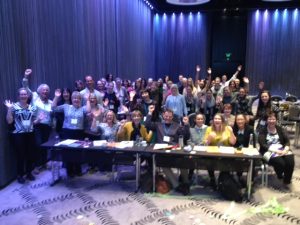Congratulations to Dr. Caroline Ellis-Hill on the publication of her article ‘We are not the same people we used to be: An exploration of family biographical narratives and identity change following traumatic brain injury’. This paper was accepted for publication in 2017 and will now be finally published in its final format in the September issue of Neuropsychological Rehabilitation.
 This scientific paper focuses recovery and rehabilitation following traumatic brain injury. Accumulation of subjective changes over time has led many to examine the question of “continuity of self” post-injury. Vacillation between feeling the same and different is common and often at odds with the medical narrative preparing families for permanent change. This position of ambiguity was examined in a qualitative narrative study. The aim of this paper is to describe the narrative structures used by uninjured members of a family to understand change. These changes relate primarily, to their perspective of whether and how the injured person had changed, but also secondarily to whether and why they themselves felt they had changed in the first year post-injury. Nine uninjured family members from three families took part in three unstructured interviews during the first twelve months post-injury.
This scientific paper focuses recovery and rehabilitation following traumatic brain injury. Accumulation of subjective changes over time has led many to examine the question of “continuity of self” post-injury. Vacillation between feeling the same and different is common and often at odds with the medical narrative preparing families for permanent change. This position of ambiguity was examined in a qualitative narrative study. The aim of this paper is to describe the narrative structures used by uninjured members of a family to understand change. These changes relate primarily, to their perspective of whether and how the injured person had changed, but also secondarily to whether and why they themselves felt they had changed in the first year post-injury. Nine uninjured family members from three families took part in three unstructured interviews during the first twelve months post-injury.
In-depth narrative analysis showed family members used biographical attendance; biographical disruption; biographical continuity; and biographical reconstruction to understand change. Dr. Ellis-Hill and her co-authors argue that concentrating on a narrative of change is too limiting and that engaging in biographical narratives may help humanise care provided to injured individuals and their families. Implications for research and practice are discussed
Prof. Edwin van Teijlingen
CMMPH

 One week to go to find out more about education, practice and research at the Humanising Care, Health and Wellbeing conference 21-22 June 2018
One week to go to find out more about education, practice and research at the Humanising Care, Health and Wellbeing conference 21-22 June 2018











 BU attendance at third annual GCPHR meeting in June
BU attendance at third annual GCPHR meeting in June Interactive Tangible and Intangible Heritage Applications – BU student work featured in new book chapter
Interactive Tangible and Intangible Heritage Applications – BU student work featured in new book chapter Second NIHR MIHERC meeting in Bournemouth this week
Second NIHR MIHERC meeting in Bournemouth this week MSCA Postdoctoral Fellowships 2025 Call
MSCA Postdoctoral Fellowships 2025 Call ERC Advanced Grant 2025 Webinar
ERC Advanced Grant 2025 Webinar Horizon Europe Work Programme 2025 Published
Horizon Europe Work Programme 2025 Published Horizon Europe 2025 Work Programme pre-Published
Horizon Europe 2025 Work Programme pre-Published Update on UKRO services
Update on UKRO services European research project exploring use of ‘virtual twins’ to better manage metabolic associated fatty liver disease
European research project exploring use of ‘virtual twins’ to better manage metabolic associated fatty liver disease